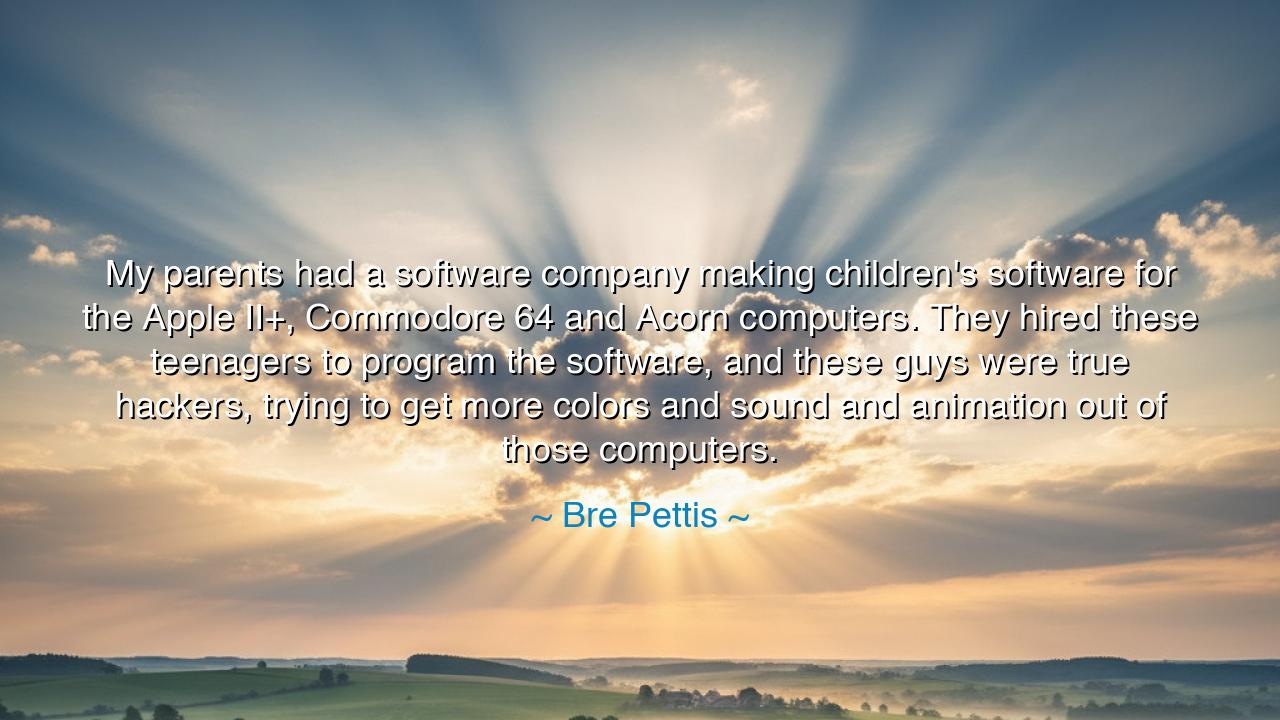
My parents had a software company making children's software for
My parents had a software company making children's software for the Apple II+, Commodore 64 and Acorn computers. They hired these teenagers to program the software, and these guys were true hackers, trying to get more colors and sound and animation out of those computers.






In the days when the digital world was still young, and the hum of machines was like the murmur of newborn gods, Bre Pettis spoke of a time of creation and wonder. He said, “My parents had a software company making children's software for the Apple II+, Commodore 64 and Acorn computers. They hired these teenagers to program the software, and these guys were true hackers, trying to get more colors and sound and animation out of those computers.” His words are both remembrance and revelation — a tribute to the spirit of those who came before, the pioneers who turned crude circuitry into a canvas of imagination. In his telling, the hackers were not destroyers, but dreamers; not thieves, but artists of logic, seekers of beauty within the cold precision of code.
To understand the meaning of his words, we must journey back to the early 1980s, when computers were not yet the sleek and boundless tools we know today. They were humble machines — boxes of light and sound with limited memory, tiny screens, and a language only a few understood. The Apple II+, the Commodore 64, and the Acorn were the sacred altars of that first digital generation. Upon these primitive devices, children and teenagers labored not for fame or wealth, but for the sheer joy of creation. Each line of code was a whisper to the machine: “Show me what you can do.” Every pixel of color, every chime of sound, every flicker of animation was a small victory — a triumph of spirit over limitation.
These young hackers that Pettis remembers were like the inventors and philosophers of the ancient world — bold minds who saw potential where others saw impossibility. They were the Da Vincis and Galileos of the digital dawn, who, with patience and cunning, coaxed miracles from machines that by all logic should not have been capable of them. In those early days, memory was measured in kilobytes, colors were few, and sound was coarse — yet from such scarcity came abundance, from limitation came innovation. This is the paradox of creation: when boundaries are tight, the imagination must stretch wider.
Consider the tale of Rob Hubbard, one of those legendary composers for the Commodore 64. With only three sound channels and a tiny processor, he composed entire symphonies of digital music — harmonies and rhythms that pulsed with life, emotion, and power. He, too, was a “true hacker,” as Pettis called them — not a breaker of systems, but a breaker of barriers. Like the artisans of old who carved cathedrals from stone, these digital craftsmen built worlds within constraints, proving that creativity is not born from infinite resources, but from the refusal to accept limits.
The deeper wisdom in Pettis’s memory lies not in nostalgia, but in philosophy. The spirit he describes — of pushing beyond what a thing was “meant” to do — is the essence of all human progress. The hacker’s heart is the same that beat in the minds of inventors, explorers, and dreamers of every age. It is the belief that the world, no matter how finished it seems, is still open to transformation. To be a “true hacker,” in the sacred sense of the word, is to approach all of life with curiosity and courage — to look at the boundaries of reality and ask, “What if this could be more?”
Yet, there is also tenderness in his words — for the children’s software his parents made was not merely entertainment, but education wrapped in wonder. Those hackers and dreamers, guided by purpose, were not creating for profit alone. They were building gateways for the imagination, tools through which young minds could explore, learn, and play. Thus, Pettis reminds us that technology, when born from curiosity and compassion, can be a force of light — a bridge between learning and creation, between the coldness of machine and the warmth of human intent.
Let this story be a lesson to all who live in the present age, surrounded by infinite technology but often starved of wonder. Do not curse your limitations — use them. Do not wait for perfect tools — make masterpieces with what you have. Be as those early hackers were: fearless, inventive, alive with curiosity. Whether your work is of code, words, stone, or heart, let it be done with that same audacious spirit — the will to draw more color, more sound, more life out of the world than it was ever meant to give.
For the wisdom of Bre Pettis’s words is this: that progress is not born in luxury, but in necessity; not in ease, but in effort. The pioneers of old did not wait for permission from the future — they built it, line by line, with hands trembling in excitement and eyes burning with vision. And so must we. For the machines may have changed, but the call remains the same — to be, in every field and every age, true hackers of possibility, turning the limits of today into the wonders of tomorrow.






AAdministratorAdministrator
Welcome, honored guests. Please leave a comment, we will respond soon